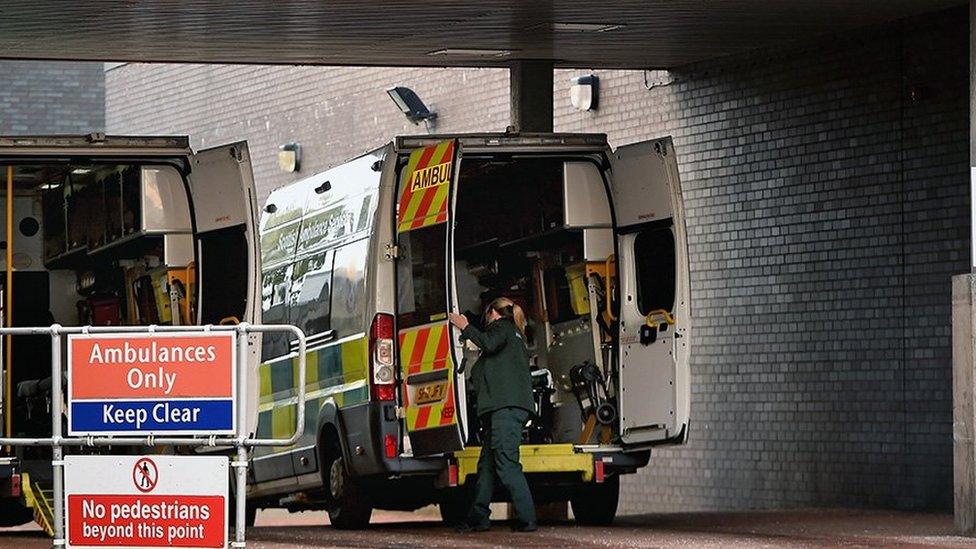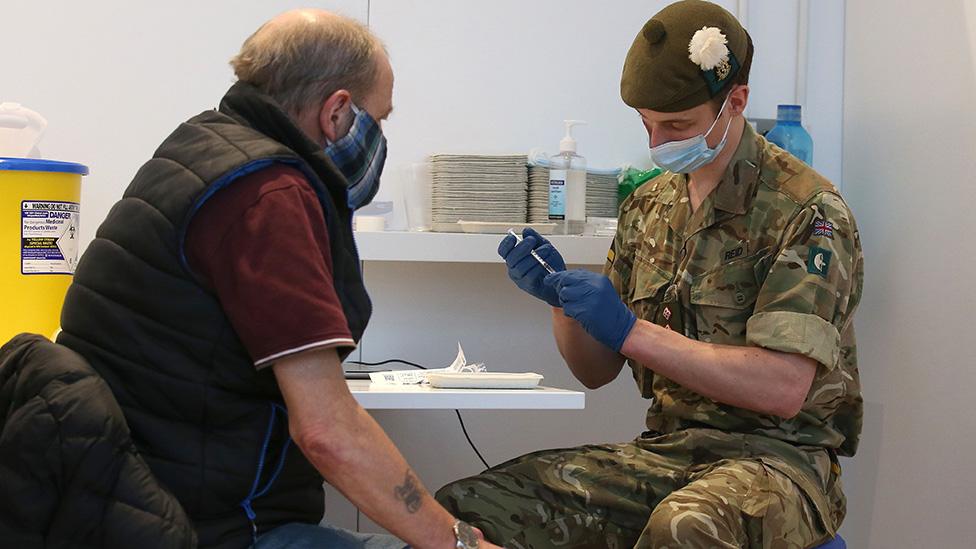Covid in Scotland: Soldiers to drive ambulances under military aid plan
- Published
- comments

Soldiers will be drafted in to drive ambulances in a bid to ease the "unprecedented" pressure on the NHS.
Scottish Ambulance Service chief executive Pauline Howie said logistical staff would also be made available to support paramedics and technicians.
Ms Howie said the impact of Covid had placed the service at its "highest level of escalation".
On Thursday, the Scottish government confirmed it had asked the MoD for military assistance.
Ms Howie was asked on BBC Radio's Good Morning Scotland programme if it would mean soldiers driving NHS ambulances or army ambulances.
She said: "I would expect the former and we will be working through the details of that over the coming days."
Her comments came after it emerged an 86-year-old woman had to wait eight hours for an ambulance after falling and breaking her hip at home.
Lillian Briggs, who has Parkinson's, skin cancer and has had two heart attacks, was left lying on her kitchen floor in agony after blacking out.
'Unprecedented challenges'
Her son, Robert Ewing, and his sister rang for an ambulance a number of times only to be told their mother was in the system but was not a priority.
Mr Ewing told BBC Scotland: "I thought she was going to die in front of us."
The Scottish Ambulance Service apologised for the delay and confirmed it was investigating the circumstances.
First Minister Nicola Sturgeon said health services were dealing with the most challenging combination of circumstances in their history due to the Covid-19 pandemic.
Opposition politicians have highlighted a series of serious ambulance delays, including one where a man died after a 40-hour wait.
Ms Howie was asked on Good Morning Scotland if the two cases highlighted in the media were "anomalies".
She said: "The vast majority of patients, for immediately life-threatening patients, will receive a response under 10 minutes and for other emergency patients, under 40 minutes."
The chief executive confirmed the service would apologise directly to the families and share the findings of its reviews into the circumstances.
Ms Howie also described the current pressures on the NHS as "unprecedented" and added staff face an "extremely challenging" winter.

Armed forces personnel are already involved in the Covid vaccination programme
Scottish Conservative health spokesman Dr Sandesh Gulhane told the programme the problem was not new and recalled one of his patients waiting eight hours for an ambulance in 2018.
Highlighting the stress on all parts of the health service, he said on Monday alone he had 80 patient contacts during his GP shift.
Dr Gulhane said: "Ambulances queuing round the block. Record A&E waiting times. This is shining a light on a crumbling NHS that happened before Covid."
He also accused the Scottish government of using the pandemic as a "smokescreen for everything".
Scottish Labour health spokeswoman Jackie Baillie welcomed the involvement of the military.
But she told Good Morning Scotland: "What it demonstrates is that the ambulance service and the NHS are absolutely in crisis, and this is all before the winter starts."
'Eye off the ball'
Ms Baillie also said ministers had "taken their eye off the ball" and failed to respond to delays which were reported in June.
She added efforts should now be made to bring back recently-retired staff and increase capacity.
One suggestion has been to reopen the NHS Louisa Jordan at the Scottish Event Campus in Glasgow.
The temporary facility, which closed in March, carried out outpatient and diagnostic appointments, hosted training and accepted blood donations.
Dr John Montgomery told BBC Scotland's The Nine: "Given that the critical problem that we face right now is lack of beds and the Louisa Jordan was set up effectively as a field hospital then, unfortunately, closing it because of the forthcoming COP26 may be one of the worst decisions we have made.
"The Louisa Jordan would have been a perfect place for the patients who might have required, not-necessarily high intervention levels of medicine, but perhaps required nursing care and would have been a perfect place for ambulances to take patients to."
The GP, who is based on the south side of Glasgow, added he is "very, very fearful indeed" for the winter ahead.
'Workforce capacity challenges'
The Scottish Ambulance Service said the current problems were not about capacity alone.
Ms Howie added: "I think the challenges are not just about facilities, they are about workforces as well.
"Across health and care services, there are workforce capacity challenges and those are being actively addressed by health boards."
On Thursday, Ms Sturgeon said her government was looking at a range of plans to deal with the significant challenges facing the health services.
She told the Scottish Parliament: "I'll be going back to my office to finalise the detail of the request for military assistance so we can submit that as quickly as possible."
The first minister added: "Such military assistance is already being provided to ambulance services in England and of course we have had military assistance for other aspects of the pandemic over the past 18 months."
A Scottish government spokesperson later confirmed it was seeking military assistance to address acute services, and a separate request had been made to support mobile testing units.

